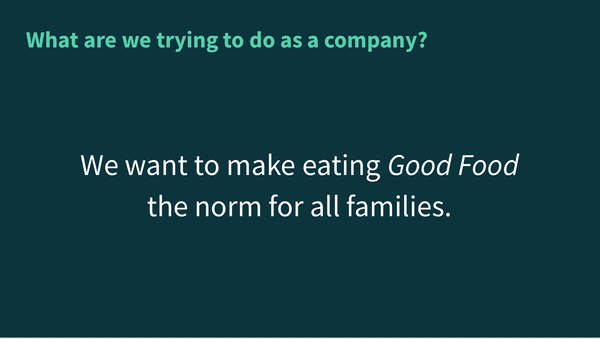Your heart is racing as you wipe the beads of sweat from your face. You struggle to sit up straight, as if your body is glued to the chair. You have no idea where the person in front of you is geographically located, but their gaze somehow pierces through the monitor. As you stumble your way through answering questions about your work experiences, you just hope some of it is landing. Unfortunately, experience suggests that you likely won’t hear back at all after this interview, let alone get the job. You metaphorically shrug your shoulders and soldier on.

I’ve been a part of many hiring processes over the years — as an applicant, hiring manager, and recruiter — and in my experience, it sucks most of the time and for pretty much everyone involved. Although I’m no expert, I’ve given this topic a lot of thought over the years because I’m a big believer in the importance of finding the best matches between applicants and roles, and I care a lot about the experiences of the people involved.
In September 2021, I gave a virtual talk to job seekers entitled “What is the hiring manager looking for?” to share a grab bag of leanings that hopefully contained some bits of wisdom. Check out the slide deck to see a storytelling version of my advice which includes fun clipart, or just read the boring text version further below.
I hope this helps some of you all feel a little less uncomfortable in your next interview - good luck!
The Hiring Manager’s Perspective
"I was already overworked, I'm spending way too much time on hiring, AND I'm worried about hiring someone who will make it worse!"
Hiring managers feel under pressure because they:
- Have unclear and/or unrealistic expectations of the responsibilities and requirements for the role
- Are relying on resumes & interview processes that aren't great at assessing fit and competence
- Are worried about hiring the wrong person and how that will impact their time, team, and reputation.
- Don’t have the time to handle the hiring process and their day to day job
So they:
- Try to find a candidate that has "all the things" and is "ready to go on day 1"
- Use a "why wouldn't this person work out" filter instead of a "how could this person be successful here" filter
- Depend on the “on paper” signals like “where did they go to school” or “what company did they work for”
- Seek referrals as a way to overcome these challenges - "So-and-so said they were good..."
- Let biases around background, demographics, etc. influence their decisions.
- Don't take the time (or aren't allowed by HR) to give feedback to the candidate on where they fell short.
The Applicant’s Perspective
I don’t know what they're looking for…or what I could be doing differently…
Many applicants feel at a loss because they:
- Don't know what subset of buzz words in the job description the hiring manager actually cares about
- Aren't practiced at sharing their experiences in an authentic and outcome-oriented way
- Get nervous which leads to rambling and/or awkwardness and/or …
So they:
- Don’t inspire confidence in the hiring manager that they are up for the task
- Leave out important elements about them that would make them stand out
- End up dejected when they don’t get the jobs they want
Things to Try
Me: I’ll apply to this job really quick
— pokey pup (@Whatapityonyou) June 5, 2021
The job: set up an account, attach a resume, fill out this application where you refill in all the information from your resume, list three references, write a cover letter, answer these five essay questions, take a skill assessme
Look, the reality is that until hiring processes stop looking like the above, it's still going to suck. So don't be too hard on yourself when things aren't going great. Regardless, here are some things you can try to increase your chances:
Preparing
- Keep track of your accomplishments as they happen, not just when you're actively searching for a new job.
- Frame experiences in terms of outcomes, not just skills and experiences, e.g. "what changed for the positive because of the work you did?"
- Take courses and/or get certifications, but only when necessary and/or you are excited about them – too often, folks start but don't finish these.
- Develop opinions about the domains you're interested in based on reading, listening, and experimenting.
- Invest in a side project / portfolio piece / writing sample, but when doing so, don't try to boil the ocean. A small, interesting artifact is better than a large, semi-coherent one.
Searching
- Make sure your LinkedIn looks good and is up to date – don't overfocus on your resume at the expense of the other ways hiring managers might find you.
- Do research on who the relevant companies are in the space you’re interested in and keep a tab on what they're up to, when they're hiring, etc.
- Find and join communities of people that share your industry / role / passion / etc. and join the conversation.
- Seek counsel from mentors - we often get in our own heads with this stuff.
- Be patient - it will likely take more time than you'd like.
Applying
- For each application, focus your cover letter and resume on the story of:
- Why are you interested in this job?
- Why are you a particularly good fit?
- Focus the top part of the resume on humans and the bottom half on robots
- People spend seconds on resumes; algorithms look for key words
- Think through whether you have any connections to existing employees of the company
- Even second or third person connections can help get past the screening stage
Interviewing
- Keep your introduction short and practice it. Try to avoid rambling since this first impression anchors the rest of the conversation.
- Have work examples ready that highlight skills and outcomes that map to the role. If the role needs are unclear, ask them to clarify! As an example: "I'm curious – what skills do you think are most important for this role?"
- Be proactive in addressing gaps – "I realize that my skillset isn't typical for this role, but X is how you can feel confident that I can do this role."
- Don't undersell your unique experiences – "One thing that I've found useful in this space has been my X unique experience / skill, which may seem unrelated, but it maps to this role in Y way."
- Describe how you went about the work you're describing in an efficient and good-natured way, directly addressing the hiring manager's fears that any given candidate could sound great, but turn out to be unproductive and/or toxic.
- Prepare at least 1 good question to ask the interviewers – "I read X about your company; how are you all thinking about Y challenge?"
- Don't undersell yourself – you have real value to bring and it's important to share a glimpse of that. At the same time, remember to thank your former colleagues, bosses, etc. – nobody achieves great work alone and indicating as such is a flag. Yes, it is tricky to get this balance right; you'll get better with practice.
- Practice.
TLDR
- The hiring process sucks, and takes too long.
- Hiring managers are often busy / uncertain / biased / etc.
- Help them help you by doing the work for them of connecting the dots between your experiences and their needs.
- Be confident in your own story – you've got this!



